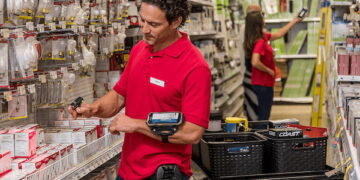Crédito: fuente
The first COVID case in the U.S. was found in January, 2020. One year later, the numbers surrounding the pandemic are alarming.
USA TODAY
Johnson & Johnson’s single-dose COVID-19 vaccine is less effective than currently authorized vaccines, new data shows, though it appears to be extremely effective against severe disease.
The J&J vaccine has been described as a «game-changer» in the campaign against the virus because it is a single dose regimen. The two authorized vaccines and other leading candidates call for double doses. It also does not need to be kept frozen, allowing it to be distributed through normal vaccine supply chains without the need for new, expensive equipment.
Those advantages come at some cost in terms of protecting against symptomatic COVID-19.
Results from a study of nearly 44,000 people suggest that J&J’s single dose will only be 66% effective – compared to more than 94% effective for Pfizer-BioNTech and Moderna’s double-dose vaccine.
The level of protection against moderate to severe COVID-19 infection was 72% in the United States, 66% in Latin America and 57% in South Africa, a month after vaccination, according to results from the company’s late-stage trial, released early Friday.
It was 85% effective against severe disease across all regions studied, the company said, and its effectiveness against severe disease increased over time with none of the vaccinated volunteers reporting severe disease more than 49 days after vaccination.
Read this: Novavax’s COVID-19 vaccine shown to be nearly 90% effective in UK clinical trial, provided a range of immunity against new variants
Once fully protected, there were no deaths in the vaccinated group and several among the placebo-recipients, though the company did not detail those cases.
Protection was generally consistent across race and age groups, including adults over 60, who were overrepresented in the trial. About 60% of trial participants were white.
In South Africa, nearly all cases were due to infection with a variant from the B.1.351 lineage. Although the company said the vaccine was generally protective there, too, the lower rates of protection might reflect this different variant.
Although the J&J vaccine may seem less desirable in some ways than vaccines with 94% effectiveness, it is protective where it counts – in preventing severe disease, hospitalizations and deaths, NIH Director Dr. Francis Collins and National Institute of Allergy and Infectious Diseases Director Dr. Anthony Fauci, both said on a morning news conference Friday.
«If you can prevent severe disease in a high percentage of individuals, that will alleviate so much of the human suffering and death,» Fauci said. «That’s the important issue.»
Both agreed that the vaccine’s lower effectiveness would pose a messaging challenge that J&J’s vaccine is not inferior in these key metrics. «You’ve got to make sure people understand the implications we’re talking about today,» Fauci said.
By comparison, the seasonal flu vaccine ranges from an average high of about 60% effective to as low as about 20% depending on the year.
Side effects appear to be lower with this vaccine than the already approved ones.
J&J reported that 9% of participants spiked a fever after injection, but less than 1% had a high fever; others reported pain and fatigue, but all side effects were short-lived.
Overall, more people who received a placebo reported serious adverse events than those who received the active vaccine. No one suffered a severe allergic reaction, according to the company.
The COVID-19 vaccine is using new technology that has never been used before in traditional vaccines. Here’s how an mRNA vaccine works.
USA TODAY
The safety results were «plain vanilla,» said Dr. Matt Hepburn, COVID-19 Response Vaccine Lead in the Biden administration. «We see nothing of note. No anaphylaxis. No imbalances between vaccine and placebo on any concerning safety at all.»
Collins added: «The safety record is extremely good for this vaccine as for the others that have received emergency use authorization.»
Both Pfizer-BioNTech and Moderna’s vaccines were authorized for use late last year and at least one shot of each has now been given to more than 24 million Americans.
J&J is expected to apply for emergency use authorization within the next week and receive it sometime next month.
Hepburn said vaccine should begin to be available immediately upon authorization.
A vaccine that can be given in just one dose and stored in a standard refrigerator would make a significant contribution to the fight against COVID-19, said Moncef Slaoui, who helped run Operation Warp Speed during the Trump administration and is now an advisor to the Biden administration.
«From a public health standpoint, if you get one shot and within a week or two from that shot you’re now vaccinated, and the vaccine can be stable at fridge temperatures, it’s so much easier (than current vaccines),» he said. «Look how difficult it is to vaccinate people. If you cut that by 50%, it’s transformational.»
J&J decided to pursue its single-dose approach at a time when the effectiveness of the other vaccines was not known and the U.S. Food and Drug Administration said it would approve any vaccine that was safe, appropriately manufactured and more than 50% effective.
Explore how COVID-19 vaccine works: An augmented reality journey into the body
Now, the public is unlikely to be happy a vaccine with less than 70% effectiveness, Slaoui said, but «anything in the 70s or 80s is very, very good.»
The company could provide booster shots later, if necessary to improve effectiveness, he said.
Generally, a second dose of a vaccine is expected to boost its effectiveness and the longevity of its protection.
J&J is conducting a parallel trial in the U.K. testing two doses of its vaccine to see if that provides stronger effectiveness. That trial will include up to 30,000 volunteers from Belgium, Colombia, France, Germany, the Philippines, South Africa, Spain, the United Kingdom and the United States. Results from that trial won’t be available for another few months.
Because of the newness of the virus that causes COVID-19, which only came to the world’s attention a little more than a year ago, all three vaccines have only been studied for their short-term effectiveness.
The company plans to analyze trial data to look for other disease variants and to understand whether the vaccine can prevent the transmission of COVID-19, J&J Chief Scientific Officer Dr. Paul Stoffels said in the Friday news conference.
To increase speed, COVID-19 vaccine trials have focused on preventing symptomatic disease and its still unclear whether they also protect people against spreading the disease to others. That’s why people who have been vaccinated are still recommended to wear masks and avoid crowds.
Stoffels said the company should be able to determine whether its vaccine also prevented transmission. «Stay tuned,» he said.
The company also plans to present more detailed data when it goes before the U.S. Food and Drug Administration next month for emergency use authorization.
All the vaccines are currently being authorized for emergency use rather than full approval, because they have not had time to test their products for long-term effectiveness and safety.
J&J’s vaccine is based on a different technology than the other two authorized vaccines.
J&J uses a cold virus called adenovirus 26, which has been genetically modified so that it can no longer replicate in humans and cause disease. The modified virus infects human cells and delivers a protein found on the outside of the SARS-CoV-2 virus that causes COVID-19.
Although a second dose is believed to boost effectiveness, repeat dosing beyond that might not be effective, as the immune system can learn to recognize the adenovirus and will clear it out of the body before it can deliver its payload.
The company’s AdVac® technology platform was also used to develop and manufacture its approved Ebola vaccine and its Zika, RSV, and HIV candidate vaccine, which are still being developed. So far, the technology has been tested in more than 200,000 people as part of clinical trials, including the ones for COVID-19.
The COVID-19 vaccine is estimated to remain stable for two years at -4°F and at least three months at 35-36°F, so it could be distributed relatively easily through standard vaccine distribution channels.
The Trump administration bought 200 million doses of each of the Pfizer-BioNTech and Moderna vaccines – with 100 million of each due by the end of March and the balance by summer – and spent nearly $1.5 billion helping J&J develop its vaccine and produce 100 million doses.
Two other vaccine candidates, one from AstraZeneca-Oxford University and the other from biotech company Novavax, are also completing large-scale trials and, if proven safe and effective, should become available in the coming months. The United States has pre-purchased 300 million doses of the AstraZeneca Oxford vaccine and 100 million of the Novavax product.
Contact Karen Weintraub at [email protected].
Health and patient safety coverage at USA TODAY is made possible in part by a grant from the Masimo Foundation for Ethics, Innovation and Competition in Healthcare. The Masimo Foundation does not provide editorial input.
Read or Share this story: https://www.usatoday.com/story/news/health/2021/01/29/johnson-covid-vaccine-safe-effective-trials-show/6693563002/








